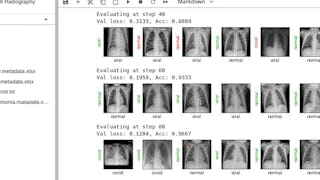Filter by
SubjectRequired
LanguageRequired
The language used throughout the course, in both instruction and assessments.
Learning ProductRequired
LevelRequired
DurationRequired
SkillsRequired
SubtitlesRequired
EducatorRequired
Explore the Aerial Robotics Course Catalog

Skills you'll gain: Feature Engineering, Tensorflow, Exploratory Data Analysis, Data Quality, Applied Machine Learning, Keras (Neural Network Library), Machine Learning, Google Cloud Platform, MLOps (Machine Learning Operations), Data Strategy, Supervised Learning, Machine Learning Algorithms, Data Analysis, Performance Tuning, Big Data, Data Pipelines, Artificial Neural Networks, Data Ethics, Cloud Computing, Deep Learning

UiPath
Skills you'll gain: Robotic Process Automation, Web Scraping, Business Process Automation, Automation, Data Import/Export, Microsoft Excel, Workflow Management, User Interface (UI)

Johns Hopkins University
Skills you'll gain: Remote Access Systems, Linux, Restful API, Web Applications, Security Controls, Internet Of Things, Embedded Systems, Application Programming Interface (API), Linux Commands, Command-Line Interface, Secure Coding, Electronics, Control Systems, Electronic Hardware, System Configuration, General Networking, Python Programming, Hardware Troubleshooting, Software Installation, Peripheral Devices

University of Glasgow
Skills you'll gain: Deep Learning, Data Ethics, Health Informatics, ICD Coding (ICD-9/ICD-10), Clinical Data Management, Data Mining, Descriptive Analytics, Database Design, Electronic Medical Record, Precision Medicine, Healthcare Ethics, Electocardiography, Machine Learning, Machine Learning Methods, Patient Flow, Artificial Neural Networks, Predictive Analytics, Applied Machine Learning, Image Analysis, Time Series Analysis and Forecasting
 Status: Free
Status: FreeCoursera Project Network
Skills you'll gain: PyTorch (Machine Learning Library), Deep Learning, Image Analysis, Computer Vision, Artificial Neural Networks, Feature Engineering, Data Validation

Coursera Project Network
Skills you'll gain: PyTorch (Machine Learning Library), Image Analysis, Deep Learning, Artificial Neural Networks, Machine Learning Methods, Medical Imaging, Computer Vision, X-Ray Computed Tomography

University of Colorado Boulder
Skills you'll gain: Data Ethics, Security Awareness, Ethical Standards And Conduct, Computer Security Awareness Training, Cybersecurity, Diversity Awareness, Generative AI, Artificial Intelligence, Information Technology, Information Privacy, Media and Communications, Machine Learning, Automation, Cultural Diversity, Personally Identifiable Information, Artificial Intelligence and Machine Learning (AI/ML), Social Justice, Law, Regulation, and Compliance, Emerging Technologies, Health Care

L&T EduTech
Skills you'll gain: Product Lifecycle Management, Embedded Systems, Embedded Software, Manufacturing and Production, Robotic Process Automation, Manufacturing Processes, Control Systems, Computer-Aided Design, Manufacturing Operations, Programmable Logic Controllers, Automation, Internet Of Things, Production Process, Mechanical Design, Cyber Engineering, Lean Manufacturing, Digital Transformation, Business Technologies, Engineering Analysis, C (Programming Language)

Skills you'll gain: Deep Learning, Artificial Neural Networks, Image Analysis, Computer Vision, Machine Learning Methods, Generative AI, Applied Machine Learning, Natural Language Processing, Scalability, Artificial Intelligence, Reinforcement Learning, Performance Tuning
 Status: New
Status: NewJohns Hopkins University
Skills you'll gain: Artificial Intelligence and Machine Learning (AI/ML), Performance Metric, Strategic Leadership, Strategic Decision-Making, Data Quality, Applied Machine Learning, Data Ethics, Machine Learning, Supervised Learning, Algorithms, Artificial Neural Networks, Data Validation, Random Forest Algorithm, Resource Utilization, System Requirements
 Status: Free
Status: FreeDeepLearning.AI
Skills you'll gain: Generative AI, Jupyter, PyTorch (Machine Learning Library), Image Analysis, Sampling (Statistics), Artificial Neural Networks, Artificial Intelligence and Machine Learning (AI/ML), Algorithms

Skills you'll gain: PyTorch (Machine Learning Library), Deep Learning, Artificial Intelligence and Machine Learning (AI/ML), Machine Learning, Artificial Neural Networks, Python Programming, Regression Analysis, Performance Tuning, System Configuration, Development Environment, Software Installation
Aerial Robotics learners also search
In summary, here are 10 of our most popular aerial robotics courses
- Machine Learning with TensorFlow on Google Cloud en Español: Google Cloud
- Step into RPA: UiPath
- Beginning Custom Projects with Raspberry Pi: Johns Hopkins University
- Informed Clinical Decision Making using Deep Learning: University of Glasgow
- Facial Expression Recognition with PyTorch : Coursera Project Network
- Detecting COVID-19 with Chest X-Ray using PyTorch: Coursera Project Network
- Computing, Ethics, and Society: University of Colorado Boulder
- Digital Technology in Manufacturing: L&T EduTech
- An Introduction to Practical Deep Learning: Intel
- Introduction to AI: Key Concepts and Applications: Johns Hopkins University










